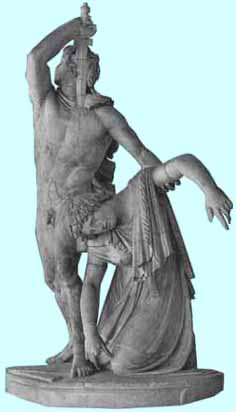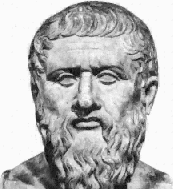During the Hellenistic period, we assist to a changed conception of the Greek man and his life. He is finally rather freed from the ties that characterised the 5th century b.C. scenario where he was seen, and consequently felt himself, mainly – if not exclusively – as a member of the community, a citizen of his πόλις, principally belonging to his family and his tribe. His life was now conceivable under a diverse and autonomous perspective, far away from the authority thanks to the new larger distances that Alexander the Great had created within his humongous empire.
Greek man starts joining clubs in accordance with his trade or hobbies, begins reading avidly and more down to earth subjects rather than the topics upon which epic and the classic tragedy was based. Realism was the main issue in those days: artists active in any field (sculpture, painting, poetry…) started to represent reality in any possible way, leaving to the past the canons of the classic period. This implied no more images of gods and heroes, representing abstractly beauty, courage and rage, but realistic and more common resembling people with feelings and even flaws! In this very same period the interest for great men grew, as well as the audience of readers, including for the first time even women. This interest stimulated the birth of biography as an independent literary genre from history.

During the classical period the interest of historians like Herodotus and Thucydides for biography had been quite immaterial, as it was not even considered a separate genre. Probably the attention exclusively placed on ideal characters, myths and epic heroes prevented any interest in the analysis of the actual men. Furthermore life was believed in the hands of Τύχη (chance or fate) and consequently any effort of men on earth was of no avail – men’s frailty meant to a certain extent their uselessness. Finally men were deemed too equal to leave anyone enough room to excel too much with respect to his fellow citizens.
Nonetheless, we find early writers who commenced narrating about some personal characteristics or episodes, such as Ion of Chios (490 b.C.) who wrote in his Epidemiai (Travels) also anecdotes about Pericles and Sophocles in order to give to his readers some additional information about the person and not simply of his opus or acts.
Almost one century later Isocrates (with his Evagoras I of Salamina) and Xenophon (with his Agesilaus II of Sparta) developed a new variant: the encomium, which is the biography of kings and emperors mainly aimed at magnifying their greatness as men as well as monarchs.
Aristoxenus of Taras can be considered the real father of biography as a separate literary category. A convinced Pythagorean he travelled widely and then settled down in Athens, where he became one of the best students of Aristotle. Disillusioned for not having been appointed as successor of Aristotle in leading the Lyceum, he left the school (322 b.C.) and started writing extensively (about 450 books) on almost any possible subject (history, musicology, philosophy etc.). Unfortunately only three books of the Elements of Harmony, an incomplete musical treatise, have reached us.
Aristoxenus wrote biographies of Pythagoras, Archytas, Socrates, and Plato. His approach to biography was not simply following the Aristotelic interest for the classification of individual characters, since his personal idea was to rely on the interpretation of life and writings of great men in order to comprehend their thought and greatness. Aristoxenus was probably the first one who showed that great men were not merely or solely the heroes, kings or generals, but people who had a memorable life thank also to their thought – evidence is that he lived in the age of Alexander the Great, whose biography he did not write….
Thus with his writings he initiated a new genre, and almost all the successive biographers started following his framework, as a template: historical scenario, birth, early youth, paramount episodes to reveal the character and finally death. Aristoxenus often liked to enrich this framework with stingy personal opinions plus anecdotes and curiosities generally in order to show off his vast culture and deep erudition.
Following the trail created by Aristoxenus, Satyrus of Callatis Pontica, who lived and worked mainly in Egypt, wrote biographies of Euripides, Pythagoras, and Demosthenes. Then he shifted his attention to Dionysus II of Syracuse, and Philip II of Macedonia. He was, nevertheless, a balanced writer avoiding to downsize his biographies to legendary tales…
Antigonus of Caristos was principally a sculptor; probably he participated to some bronze artefacts in Pergamus by Attalus court. However he wrote his Lives of the Philosophers, a very detailed and erudite account, based on original material and personal interviews. Almost in the same period Hieronymus of Cardias wrote nearly an encomium of Demetrius I Poliorcetes.
Also true historians, in their comprehensive and encyclopaedic writings, started to write and linger more on life of important characters. Theopompus, of Chios (378-323 b.C.) wrote extensively about Philip II of Macedonia, plus encomia of Mausolus, Philip and Alexander. Even Polybius, within his famous historical treatise on the birth and growth of the Roman Empire, lingers on the personality of the Achaean general Philopoemen.
Regardless this production and the growing interest of the readers, both biography and autobiography, whose first example is the Memoirs of Aratus of Sicyon (271-213 b.C.), were destined to be considered a minor art, a sub-category of history even centuries later in Rome…
Later on, starting with Plutarch biography slowly acquired its own dignity, and as much as someone more recently has reached to the conclusion that History itself is made of the histories of those who have had the fortune/misfortune to influence it.




